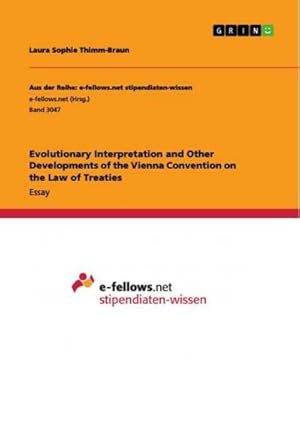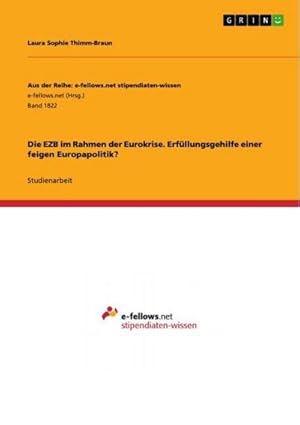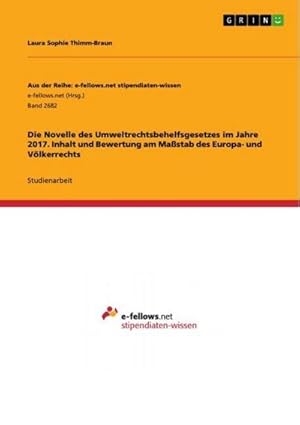laura sophie thimm braun (5 Ergebnisse)
Produktart
- Alle Produktarten
- Bücher (5)
- Magazine & Zeitschriften
- Comics
- Noten
- Kunst, Grafik & Poster
- Fotografien
- Karten
-
Manuskripte &
Papierantiquitäten
Zustand
- Alle
- Neu
- Antiquarisch/Gebraucht
Einband
- alle Einbände
- Hardcover
- Softcover
Weitere Eigenschaften
- Erstausgabe
- Signiert
- Schutzumschlag
- Angebotsfoto
- Kein Print-on-Demand (4)
Land des Verkäufers
Verkäuferbewertung
-
The Internet. A Threat or a Benefit for the Intellectual Property?
Verlag: GRIN Verlag Aug 2016, 2016
ISBN 10: 3668222223ISBN 13: 9783668222229
Anbieter: BuchWeltWeit Ludwig Meier e.K., Bergisch Gladbach, Deutschland
Buch Print-on-Demand
Taschenbuch. Zustand: Neu. This item is printed on demand - it takes 3-4 days longer - Neuware -Project Report from the year 2013 in the subject Law - Miscellaneous, grade: 13, University of Leipzig (Institut für Grundlagen des Rechts), course: Exploring Legal Cultures Project - Partnership Leipzig/Malang - Jakarta, language: English, abstract: Over the last few decades the digital media became a new form of communication. It is now impossible to imagine a life without the use of CDs, DVDs, USB drives and the Internet. Digital media and communication networks are creating a significant difference for international exchange and technological development. The term of 'digital media products' refers to'intellectual products made available in digital electronic form, whether operational in computers or other machines capable of reading works in digital form'. Especially for the economic flow it is of great importance to support the safety of digital media. In this context, however, many conflicts have come up, most recently on the issue of online privacy and property rights. They are expressed in contradicting interests of intellectual property rights-holders and the general public. On one hand it is necessary to protect the original creative investment and enable legal reuse of works. On the other hand the interest of intellectual property right holders and users must be recognized. In order to achieve a balance between these contradicting interests an adaption of the legal backdrop in respect of property laws to the new media cultures is necessary. Current jurisdiction, as will be argued in this paper, can not yet cover the new patterns of use on the Internet. 16 pp. Englisch.
-
Evolutionary Interpretation and Other Developments of the Vienna Convention on the Law of Treaties
Verlag: GRIN Verlag
ISBN 10: 3668922306ISBN 13: 9783668922303
Anbieter: Smartbuy, Einbeck, Deutschland
Buch
Taschenbuch. Zustand: Neu. Druck auf Anfrage Neuware - Printed after ordering - Essay from the year 2019 in the subject Law - European and International Law, Intellectual Properties, grade: 1,0, University of Vienna (Institut für Europa- und Völkerrecht), language: English, abstract: This essay is concerned with the ramifications of the interpretation of the Vienna Convention on the Law of Treaties.The Vienna Convention on the Law of Treaties, from now on referred to as VCLT, constitutes the 'bible' of international practitioners. Like the United Nations Charter, the widespread clarity and intelligence of its drafting have enabled States to comply with the rules and adapt their practice without distorting or departing from the VCLT. The rules provide an important framework which is flexible enough for States to accommodate alternatives, variations and even developments in their state practice. The provisions of the VCLT leave the states room for individual concretisation.Some commentators say the VCLT has had its day and is incapable of dealing with the challenges of the 21st century. However, the VCLT has proved itself to be a most adaptable tool, as it was able to deal with challenges of the past decades. In order to do so, the provisions of the VCLT were clarified, modified, developed, or amended.This paper aims at discussing the development of several selected provisions of the VCLT as well as analysing the new types of interpretation, such as the evolutionary interpretation. The difference between the original provisions and the present state of the law will be outlined in this paper. 16 pp. Englisch.
-
The Internet. A Threat or a Benefit for the Intellectual Property?
Verlag: GRIN Verlag, 2016
ISBN 10: 3668222223ISBN 13: 9783668222229
Anbieter: AHA-BUCH GmbH, Einbeck, Deutschland
Buch
Taschenbuch. Zustand: Neu. Druck auf Anfrage Neuware - Printed after ordering - Project Report from the year 2013 in the subject Law - Miscellaneous, grade: 13, University of Leipzig (Institut für Grundlagen des Rechts), course: Exploring Legal Cultures Project - Partnership Leipzig/Malang - Jakarta, language: English, abstract: Over the last few decades the digital media became a new form of communication. It is now impossible to imagine a life without the use of CDs, DVDs, USB drives and the Internet. Digital media and communication networks are creating a significant difference for international exchange and technological development. The term of 'digital media products' refers to'intellectual products made available in digital electronic form, whether operational in computers or other machines capable of reading works in digital form'. Especially for the economic flow it is of great importance to support the safety of digital media. In this context, however, many conflicts have come up, most recently on the issue of online privacy and property rights. They are expressed in contradicting interests of intellectual property rights-holders and the general public. On one hand it is necessary to protect the original creative investment and enable legal reuse of works. On the other hand the interest of intellectual property right holders and users must be recognized. In order to achieve a balance between these contradicting interests an adaption of the legal backdrop in respect of property laws to the new media cultures is necessary. Current jurisdiction, as will be argued in this paper, can not yet cover the new patterns of use on the Internet.
-
Die EZB im Rahmen der Eurokrise. Erfüllungsgehilfe einer feigen Europapolitik?
Verlag: GRIN Verlag, 2016
ISBN 10: 3668223122ISBN 13: 9783668223127
Anbieter: AHA-BUCH GmbH, Einbeck, Deutschland
Buch
Taschenbuch. Zustand: Neu. Druck auf Anfrage Neuware - Printed after ordering - Studienarbeit aus dem Jahr 2014 im Fachbereich Jura - Europarecht, Völkerrecht, Internationales Privatrecht, Note: 13 Punkte, Universität Leipzig (Völker- und Europarecht), Veranstaltung: Europarechtliche Probleme, Sprache: Deutsch, Abstract: Gegenstand der nachfolgenden Erörterung wird die Rolle der Wirtschafts- und Währungspolitik in der Eurokrise sein. Vertieft analysiert und auf deren Rechtmäßigkeit hin geprüft werden zwei aktuelle Maßnahmen der Europäischen Wirtschaftsgemeinschaft, namentlich die Übertragung der Bankenaufsicht auf die Europäische Zentralbank (EZB) sowie der Ankauf von Staatsanleihen auf dem Sekundärmarkt durch die EZB. Im Zuge dessen wird auch darauf eingegangen, inwieweit die EZB der provozierenden These 'der Erfüllungsgehilfe einer feigen Europapolitik' gerecht wird.Die Staatsschuldenkrise hat die Weltwirtschaft vor neue Herausforderungen gestellt. Darin wurde auch der Euro in seiner Stabilität schwer beeinträchtigt. Dr. Angela Merkel fasste die damit verbundenen Gefahren in den Worten 'Scheitert der Euro, scheitert Europa' zusammen. Der Ausbruch dieser Krise hängt dabei jedoch mit der viel größeren Finanzkrise 2008/20091 zusammen. Es ist bereits im Voraus klar zu stellen, dass es sich bei dieser 'Krise' nicht nur um eine Eurokrise handelt. Vielmehr ist sie aus der Finanzkrise 2008/2009 hervorgegangen. Die Ausgangsproblematik spiegelt sich deshalb am trefflichsten im Begriff der Staatsschuldenkrise wider. Dieser bezeichnet nicht nur ein bestimmtes geographisches Gebiet, sondern bezieht sich auf die konkrete Problemlage dieser Krise, nämlich der Verschuldung einzelner Staaten.Mit dem Begriff der Eurokrise ist eine geographische Einschränkung gegeben, die sich, um genau zu sein, nur auf die Eurostaaten der Europäischen Union beziehen müsste. Im Folgenden sind mit dem Begriff der Eurokrise auch Nicht-Euro-Länder angesprochen. Denn die Krise wirkte sich schließlich auch auf die Teilnehmerstaaten der gesamten Europäischen Union (EU) aus. Gerade die EU als Ganze hat in den letzten Jahren zu spüren bekommen, dass der Vertrag von Maastricht einige Gesetzeslücken und ungeklärte Probleme aufzeigt. Mit ad hoc Maßnahmen hat die Europäische Wirtschaftsgemeinschaft versucht weitere Staatspleiten zu verhindern. Doch stießen einige dieser Maßnahmen sowohl im ökonomischen, politischen, als auch im juristischen Bereich auf große Kritik.
-
Die Novelle des Umweltrechtsbehelfsgesetzes im Jahre 2017. Inhalt und Bewertung am Maßstab des Europa- und Völkerrechts
Verlag: GRIN Verlag, 2018
ISBN 10: 3668650454ISBN 13: 9783668650459
Anbieter: AHA-BUCH GmbH, Einbeck, Deutschland
Buch
Taschenbuch. Zustand: Neu. Druck auf Anfrage Neuware - Printed after ordering - Studienarbeit aus dem Jahr 2017 im Fachbereich Jura - Europarecht, Völkerrecht, Internationales Privatrecht, Note: 13, Universität Leipzig (Umwelt- und Planungsrecht), Sprache: Deutsch, Abstract: Der damalige UN-Sekretär Kofi Annan bezeichnete die Aarhus-Konvention (AK) als 'the most ambitious venture in the area of 'environmental democracy' so far undertaken under the auspices of the United Nation'. Auf internationaler Ebene stellt das Zustandekommen der AK einen Meilenstein für Umweltbelange dar. Bereits im Jahre 1998 wurden die Verhandlungen zur AK aufgenommen, die den Grundstein für das heutige Umwelt-Rechtsbehelfsgesetz (UmwRG) darstellen. Allerdings ist die Umsetzung ins nationale Recht durch Deutschland weniger als ein 'ambitious venture' zu bezeichnen, sondern womoglich eher als 'adventure'. Am 15.12.2006 begann für Deutschland der holprige Weg hin zu einem europa- und völkerrechtskonformen UmwRG. Bereits 2009 kam es zu Änderungen des3 UmwRG a.F. 2011 musste aufgrund klarer Anweisungen des EuGH in der Trianel-Entscheidung der Gesetzgeber erneut an die Arbeit. Dies führte zur ersten großeren Novelle des UmwRG im Jahr 2013. 2015 erfolgten die Anpassung an das Altrip-Urteil, indem4, 5 UmwRG a.F. novelliert wurden. Schließlich ließ der EuGH nicht locker und kam nach einem Verletzungsverfahren der Kommission gegen Deutschland zu dem Ergebnis, dass auch das damalige Regelwerk große Lücken aufweise. Nicht nur auf europäischer Ebene, sondern auch auf internationaler Ebene wurde dem deutschen Gesetzgeber Druck gemacht. Auch die 5. Vertragsstaatenkonferenz der AK stellte eine Verletzung von Völkerrecht fest. Der deutsche Gesetzgeber wurde also immer wieder durch diverse Verfahren über einen langen Zeitraum hinweg nachdrücklich darauf hingewiesen, europa- und volkerrechtliche Vorgaben einzuhalten. Die bisher größte Novellierung erfolgte am 2.6.2017. Fraglich ist allerdings, ob diese ausreicht, um nicht wieder von den Gerichten reglementiert zu werden oder ob das UmwRG doch ein ewiger Patient bleibt.






